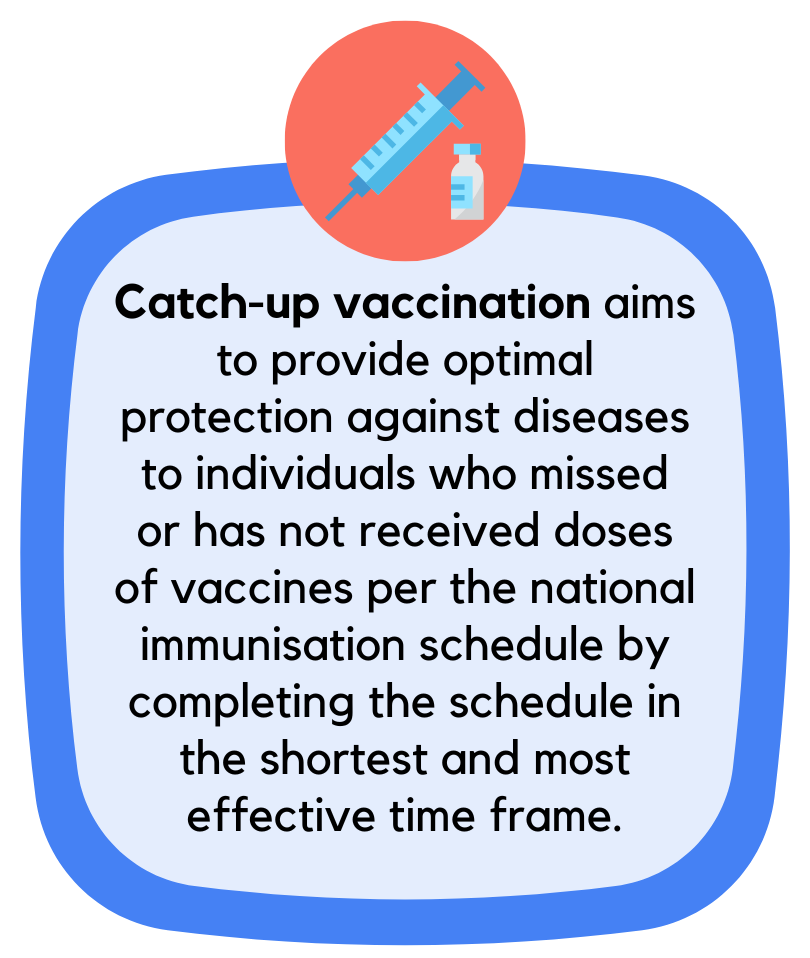Have your children taken all their vaccination shots? Or did they miss any shots, especially during the long lockdown? Have you managed to get the catch-up doses for them? Here’s what you need to know about delayed or interrupted immunisation.
Last July, the World Health Organization (WHO) reported the largest sustained decline in childhood vaccinations in approximately 30 years. WHO stated that 25 million children had missed out on one or more doses of the DTP vaccine (for diphtheria, tetanus and pertussis) in 2021 alone, raising alarm bells about the growing number of children at risk from devastating but preventable diseases.
There are numerous reasons for this decline, including the COVID-19 pandemic, as well as the lack of access to health services for children living in conflict areas and in low- and middle-income countries. In addition, harmful misinformation spread by anti-vaccine campaigners has also given rise to doubt about the efficacy of vaccines. WHO concluded that this continued decline has resulted in a drop in childhood immunisation for a whole generation, and this will inevitably lead to more disease outbreaks in the future.
This is indeed a cause for great concern, and as parents, we should take note of this worrying trend. Malaysia has not been spared, as there are also cases of delayed and interrupted immunisations here. It is important for parents to understand that if you choose to delay, skip, or reject vaccines, there can be risks, not just for your child, but also for others in your community.
What is delayed or interrupted immunisation?
Delayed immunisation refers to a situation where a child’s vaccination schedule is behind the recommended schedule but not missed completely, while interrupted immunisation refers to a situation where a child misses one or more doses of a vaccine. During the pandemic, for example, many children/infants may have missed their vaccinations due to the movement control order, or if they or someone in their family had COVID-19.
Timely vaccination is crucial to ensure that a population is fully safeguarded against vaccine-preventable diseases and sustains herd immunity. Delayed or interrupted immunisation increases the risk of vaccine-preventable diseases. It is essential to catch up on missed doses and to follow the recommended vaccination schedule to ensure adequate protection against preventable diseases.
Recognising that not all children manage to get their vaccinations on time, WHO has a “catch-up vaccination” schedule for those who have had their immunisations interrupted or those who are starting out late, with detailed recommendations for all immunisations, including HepB (hepatitis B), MMR (measles, mumps, rubella) and DTP (diphtheria, tetanus, pertussis) vaccines.

What are the consequences of missing a vaccination?
Delaying immunisation in children can result in many consequences, including increased susceptibility to vaccine-preventable diseases such as hepatitis B, pertussis and diphtheria. In worst case scenarios, these diseases can lead to serious health complications, including hospitalisation, brain damage and even death. Children who are not immunised can also spread infectious diseases to others, including people who cannot receive vaccines due to medical reasons or those who have weakened immune systems.
What should I do if my child has missed a vaccination?
Don’t fret! Consult your doctor to discuss the best course of action to catch up on missed or delayed vaccinations for your child. An accelerated or catch-up vaccination schedule may be recommended to help ensure the child is fully protected against vaccine-preventable diseases as quickly as possible. Your doctor will determine what vaccines are needed based on your child’s age and medical condition, then recommend the appropriate intervals for catch-up doses, if necessary.
The consequences of delayed or interrupted immunisation in children can be serious, both for the child and for the broader community. It is therefore imperative for parents to ensure that their children receive all recommended vaccines – on time if possible, but otherwise they can catch-up – in order to protect their health and prevent the spread of infectious diseases.






Comments